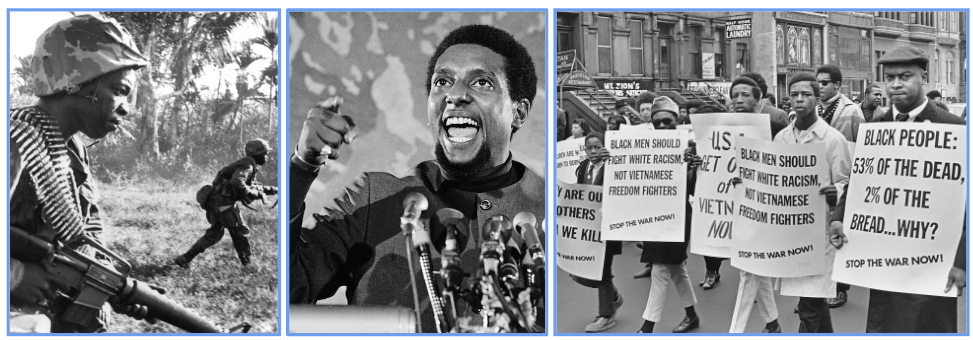TOPIC 8.8: Vietnam War
The Vietnam War: Debates, Fissures, & Transformation in Black Communities
KC-8.1.II.C.ii Americans debated the appropriate power of the executive branch in conducting foreign and military policy.
Unit 8: Learning Objective I Explain the effects of the Vietnam War.
“Why should black folks fight a war against yellow folks so that white folks can keep a land they stole from red folks? We’re not going to Vietnam. Ain’t no Vietcong ever called me n*****!” - Stokely Carmichael, 1966
“Negro boys on the front are reportedly dismayed at much of the anti-war actions in this country...to a man they are determined to see the job through.” - Pittsburgh Courier (Black Press), 1967
“We should teach that Black people are not a monolith… we need to introduce a complete history that….recognizes the full complex humanity of Black people.” - Dr. LaGarrett King’s Framework for teaching Black Historical Consciousness
Objective: Students will evaluate the extent to which the Vietnam War led to debate and change in Black discourse and in Black communities.
This Key Concept in an Antiracist classroom:
Mohammed Ali’s public criticism of the Vietnam War has carried much weight in the public consciousness. However, it clouds an intriguing fact: for most of the war, Black Americans were actually more supportive of the Vietnam War than the rest of America. From the Civil War to Cuba, to World War 1, World War 2, and Korea, Black leaders continued to hope that war service would lead to more respect and equality within American society. This was true again for Vietnam, until the end of the 1960’s. When, for the first time, Black communities expressed more disapproval for a foreign war than White communities.
Though Black soldiers were now integrated into the armed forces, they faced much discrimination and suffered a disproportionate amount of casualties.
This lesson is also in important place in the curriculum to reinforce that Black communities are not monolithic. This lesson shows students the debates and disagreements within Black communities. In his framework for teaching Black Historical Consciousness, Dr. LaGarrett King explains that this is vital in order to teach “a complete history” that “addresses and recognizes that Black people have complex and human dimensions.” King’s research has proven that this simple fact has been traditionally absent in most history curriculums.
Notes
In this lesson, you will utilize the AP best practice of being “the guide on the side, rather than the sage on the stage.”
This lesson always leads to great discussion.
As historians, we ask why. Why was this this turning point when Black Americans decided support for the war was no longer worth it?
How does this trend in declining Black support for the war reflect the shift in strategies and attitudes about the Civil Rights movement at home from the early 60’s to the late 60’s?

